Birthday celebrations start for China's aging panda star
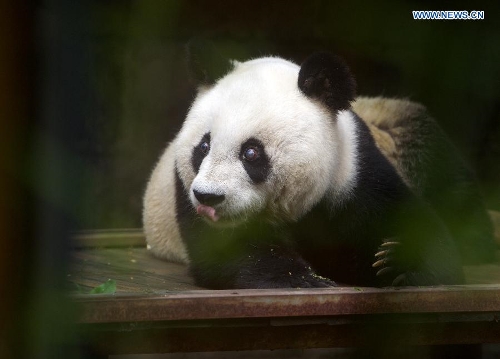
The 35-year-old giant panda Basi takes a rest after having a meal at a giant panda research center in Fuzhou, capital of southeast China's Fujian Province, May 21, 2015. Basi, the equivalent of over 100 years in human age, is the oldest living giant panda in Chinese mainland. (Xinhua/Jiang Kehong)
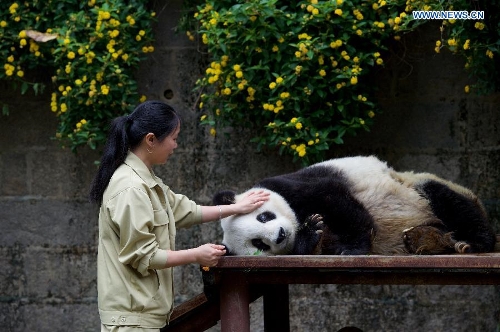
Breeder Shi Feining strokes the 35-year-old giant panda Basi after feeding a meal at a giant panda research center in Fuzhou, capital of southeast China's Fujian Province, May 21, 2015. Basi, the equivalent of over 100 years in human age, is the oldest living giant panda in Chinese mainland. (Xinhua/Jiang Kehong)
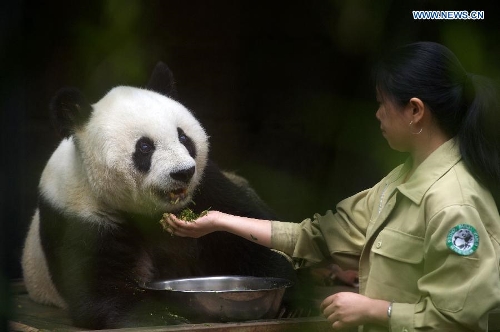
Breeder Shi Feining feeds the 35-year-old giant panda Basi at a giant panda research center in Fuzhou, capital of southeast China's Fujian Province, May 21, 2015. Basi, the equivalent of over 100 years in human age, is the oldest living giant panda in Chinese mainland. (Xinhua/Jiang Kehong)

Guests pose for a photo at an activity celebrating the 35th birthday for giant panda Basi at a giant panda research center in Fuzhou, capital of southeast China's Fujian Province, May 21, 2015. Basi, the equivalent of over 100 years in human age, is the oldest living giant panda in Chinese mainland. (Xinhua/Jiang Kehong)
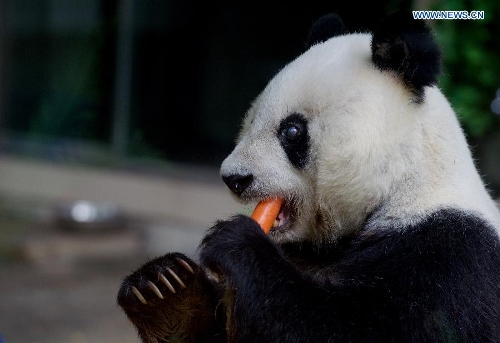
The 35-year-old giant panda Basi has a meal at a giant panda research center in Fuzhou, capital of southeast China's Fujian Province, May 21, 2015. Basi, the equivalent of over 100 years in human age, is the oldest living giant panda in Chinese mainland. (Xinhua/Jiang Kehong)
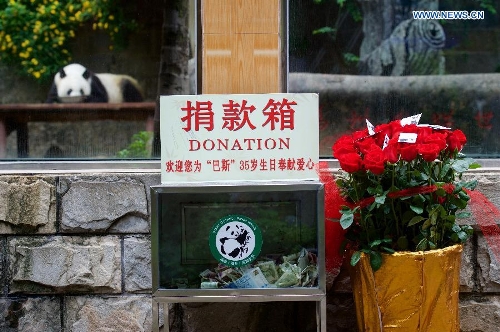
Photo taken on May21, 2015 shows a donation box outside a giant panda research center where 35-year-old panda Basi lives in Fuzhou, capital of southeast China's Fujian Province. Basi, the equivalent of over 100 years in human age, is the oldest living giant panda in Chinese mainland. (Xinhua/Jiang Kehong)
China on Friday kicked off a host of birthday celebrations for aging female panda Basi, who will turn 35 years old in November, the age-equivalent of a 100-year-old human.
"Basi is the oldest living panda in mainland China," said Chen Yucun, head of a panda research and exchange center in Fuzhou, Fujian Province, where she lives.
The average life of the wild giant panda is 15 years.
The birthday celebrations, hosted by the center, will last half a year, in the hopes of raising public awareness of panda protection and their natural habitats, said Chen.
The celebrations include making animated films about Basi, publishing books and paintings, promoting scientific knowledge about giant pandas in schools, organizing seminars and selecting "panda ambassadors" among the public, Chen said.
Basi is possibly the most famous panda in China. In 1990, she was chosen as the prototype for Pan Pan, the mascot of the Beijing Asian Games. The panda star was born in Baoxing county of southwest China's Sichuan Province.
In 2000, her health began to worsen. She was found suffering from hypertension and cataracts, said Chen.
But she survived and became the first panda in the world to successfully have a cataract removed from her eye.
"She also has dental problems, so we cut bamboo shoots into smaller pieces and feed her healthful tea and albumen powder every day," said Shi Feining, one of Basi's breeders.
"Her illnesses provided key information for panda disease prevention," said Chen, who hopes to encourage more people to protect wildlife like pandas through these celebrations.
Giant pandas are one of the world's most endangered species. According to data released by the State Forestry Administration, there were 1,864 giant pandas living in the wild and 375 ones in captivity by the end of 2013.